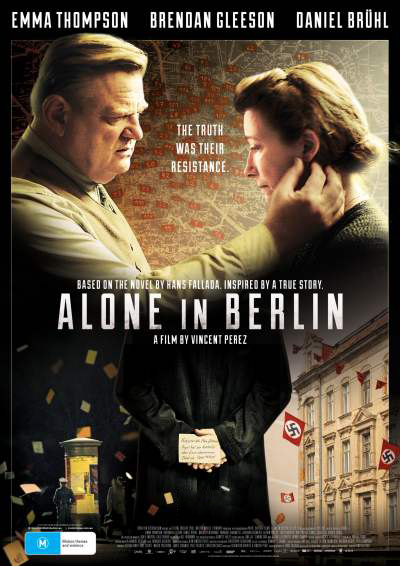The setting is Berlin in the early days of WWII. The people are rejoicing at the news that France has capitulated, and everyone expects that soon the good times will roll when Germany wins the war in a matter of weeks. Everyone that is except for Otto and Anna Hampel whose only son, a soldier, has been killed in battle. From being good law-abiding patriotic citizens who say and do all the right things in public, they secretly turn against Hitler and the war effort and embark on a campaign of writing and distributing anonymous postcards vilifying the Fuhrer and urging resistance and a return to freedom of the press, at great peril to themselves needless to say.
This film affirms my long-held belief that the best stories are true, and so it is with Alone In Berlin, which is in turn based on a book written about the case.
In some ways it is an old-fashioned film about human decency and courage in the face of overpowering evil. It reminds me of those stirring war movies of my childhood in which there’s no moral ambiguity in the filmmaker’s point of view, although God knows the circumstances facing these ordinary people give rise to appalling personal moral dilemmas: what should they do when an innocent man is arrested for their ‘crime’? Likewise for the young policeman who genuinely wants to find the culprit but is brutally pressured by the SS to make an arrest regardless of the truth.
That the secondary characters are so well-drawn enhances the ring of truth around this story: the doomed old Jewish lady upstairs hoping vainly for the return of her vanished husband, the postwoman and the retired judge who sneakily offer her kindness and support.
The film is a pan-European production but the filmmakers have opted to have all the cast speak in recognisable but understated German accents rather than in natural English or subtitled German, an unusual approach these days for a story pitched to a global audience, but it works.
Emma Thompson and Brendan Gleeson play the central roles with dignity and restraint. It’s usually the case that any good movie will at some stage move me to tears – of joy or sadness or relief or amusement, but not this one. Despite its heartbreaking truthfulness it doesn’t trade in sentimentality, and I left the cinema with no wet tissues but full of … what? Moral indignation? A yearning for justice? Perhaps I could say I felt the way I did as a young girl on reading (and re-reading) The Diary of Anne Frank.
Five stars for this one. I’d love to hear other people’s reactions to this film.



